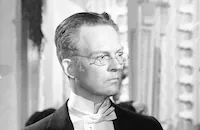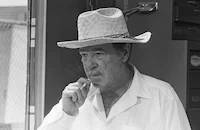The Eddie Cantor Story

Brief Synopsis
Cast & Crew
Alfred E. Green
Keefe Brasselle
Marilyn Erskine
Aline Macmahon
Arthur Franz
Alex Gerry
Film Details
Technical Specs

Synopsis
Eddie Cantor and his wife Ida arrive at Warner Bros. studios in Burbank, California, for a private screening of The Eddie Cantor Story . Just before the film rolls, Cantor whispers, "Ida, I've never been so nervous in all my life." The story begins on New York's East Side in 1904. Thirteen-year-old Eddie, eager to be accepted by the neighborhood hoodlum, Rocky Kramer, entertains a crowd at a political rally by singing, unaware that Rocky and his gang are using the opportunity to pick the listeners' pockets. After a kindly Irish cop escorts Eddie home to his Grandma Esther, Eddie sets off to deliver Sabbath candles to the home of merchant David Tobias, whose daughter, Ida, invites Eddie to stay for dinner. Soon after, Mr. Burke from the Educational Alliance persuades Grandma Esther to send Eddie to the Surprise Lake Camp for boys. Eddie's vocal performances make him an instant hit with the campers and on the way home, he wins a contest at Miners' Bowery Theatre. In the audience is Mr. Lesser, a producer who arranges for Eddie to join the Gus Edwards Kid Kabaret. For the next several years, Eddie travels with the show, sending Grandma Esther souvenir spoons from each of the cities he visits. When Eddie becomes too old for the Kid Kabaret, he returns home. Rocky Kramer, now a crooked politician with Tammany Hall, offers Eddie a job at his nightclub on Coney Island. Although nothing more than a singing waiter, Eddie, who is still fond of his childhood sweetheart Ida, boasts that he is the star of the show to impress her father. One evening, Ida and her family, accompanied by another of Ida's admirers, Harry Harris, visit the club. Horrified, Eddie sets down his tray and provides his audience with an unscheduled solo performance, but Ida's family nevertheless discovers the truth. Ida is angry at Eddie for lying, but when he tells her that a famous producer wants him to perform in London, and that he wants Ida to accompany him as his wife, she happily elopes with him. Upon discovering that the producer is broke, however, the newlyweds return home. Eddie remains unemployed until Jimmy Durante, the piano player at Kramer's club, gets him a spot in a Los Angeles show entitled Canary Cottage . The show is a success, but its star, Cleo Abbott, is jealous of Eddie's popularity. To get rid of the scene stealer, Abbott pretends that famous theatrical producer Florenz Ziegfeld wants Eddie to perform in his new Follies . The ambitious Eddie joyfully returns to New York, only to discover that Ziegfeld has never heard of him, but Eddie, who now has not only Ida but a new baby daughter to support, persuades Ziegfeld to try him out that evening. His performance of "How Ya' Gonna' Keep 'Em Down on the Farm After They've Seen Paris" is such a hit that Ziegfeld signs him to a traveling show that includes Will Rogers in its cast. As time passes, Ida has a second daughter while Eddie is on the road, but Eddie later returns to Broadway to star in Ziegfeld's new Follies . On opening night, Grandma Esther, bursting with pride and all dressed up for the show, dies peacefully in a chair. Overwhelmed with grief, Eddie is able to perform a rousing version of "If You Knew Susie Like I Know Susie" only by imagining that Grandma Esther is the sole member of the audience. During the next several years, Eddie's popularity grows as he becomes identified with hit songs such as "Bye, Bye Blackbird," "Pretty Baby," and "Yes, Sir, That's My Baby." On the night that Ida gives birth to their third baby girl, Eddie performs for the Prince of Wales and visits the hospital in blackface. Ida later begs her husband to take a vacation with the family, but Eddie, explaining that he must work hard to stay on top, suggests that they build a house on Long Island instead. Eddie's successful new show makes his schedule even more hectic. In 1929, while recovering in the hospital from the birth of yet another daughter, Ida learns from the newspaper that "Cantor Says Vacation Is Out." Weeping, Ida declares that because she and the children are not an important part of Eddie's life, their marriage is over. Eddie is crushed and offers to take Ida and his five daughters to London, but as they are planning the trip, the stock market crashes and he loses everything. With Ida's approval, Eddie returns to work in a new show entitled Whoopee and later performs in his own weekly radio show, ending each program with the tune, "(I'd Love to Spend) One Hour with You." Harry, now the family's doctor, advises Eddie to relax and spend time with family, and when Eddie stubbornly refuses, they argue. Harry declares that Eddie has always needed applause to replace the love he never received from a mother and father, while Eddie accuses his old friend of still loving Ida. Not long after, Eddie learns that Rocky has been indicted for murder, and soon after, while working late on a show, suffers a heart attack. Eddie recovers, but becomes morose and quits working. Ziegfeld thinks that Eddie is scared, and Ida wires Harry for help. When Eddie is invited to speak at the boys' camp he attended as a youth, he tells the boys that his experience at camp prevented him from joining up with Rocky, who by this time has been sentenced to death. The boys plead for a song, whereupon Eddie, reluctantly at first, sings a few of his famous tunes. Declaring that he has at last grown up, Eddie launches a string of performances for charity shows. In the projection room, the lights come up and as Eddie and Ida prepare to leave, Eddie exclaims "I never looked better in my life!"

Cast

Keefe Brasselle

Marilyn Erskine

Aline Macmahon

Arthur Franz
Alex Gerry

Greta Granstedt
Gerald Mohr
William Forrest
Jackie Barnett
Richard Monda

Marie Windsor
Douglas Evans

Ann Doran
Hal March
Will Rogers Jr.

Eddie Cantor
Ida Cantor
Susan Odin
Owen Pritchard

James Flavin
Peter De Bear
Eddie Sands
Michael Kanner

Julie Newmeyer
David Alpert
Harry Mendoza
Chick Chandler
Ralph Volkie
Bill O'brien
Diane Dawson
Dave Newell
Mickey Simpson
James Craven
Norma Amigo
Robert Jordan

Kathleen Case
Richard Gordon
Tris Coffin

Barbara Pepper

Don Dillaway
Michael Pierce
Jack Gargan
Jim Dale
Joel Smith
Marilee Phelps
Arthur Space
Kermit Maynard
Barry Brooks

Ned Young
Mira Mckinney
Gail Ganley
Steffi Sydney
John Anderson
Albert Walters
Marcoreta Hellman
Ed Haskett
Charles Morton
Paul Birch
Faire Binney
Eva Novak
Cameron Grant
Bob Stephenson
George Spaulding
Howard Brody
Ralph Gibson
Pat Mazzoti
John Gardner
Billy Perna
Henry Fladwed
Le Roy Strand
Gary Stewart
Don Bender
Dickie Leroy
Jimmy Moss
Whitey Haupt
Crew
Al Alleborn
Nat D. Ayer
Ernest R. Ball
Gordon Bau
Marjorie Best
Seymour Brown
Joe Burke
Gibson Carter
Sidney Clare
Pat Clark
Charles H. Clarke
Will D. Cobb
Irving Cohn
Frank Comstock
Con Conrad
Benny Davis
B. G. Desylva
Mort Dixon
Walter Donaldson
Al Dubin
Edwin Dupar
Gus Edwards
David Forrest
Leo Friedman
Ray Heindorf
Charles Henderson
Ray Henderson
Tony Jackson
William Jerome
Gus Kahn
Mitchell G. Kovaleski
Duke Leonard
Eddie Leonard
Gus Levene
Al Lewis
Sam M. Lewis
Henry I. Marshall
Ted Mccord
Joseph Meyer
James V. Monaco
Eddie Munson
Stanley Murphy
Ed G. Nelson
Harry Pease
Eddie Prinz
Leroy Prinz
Dave Reed Jr.
C. A. Riggs
Leo Robin
J. Russel Robinson
Jean Schwartz
Ted Sherdeman
Al Sherman
Howard Shoup
Frank Silver
Sidney Skolsky
Sidney Skolsky
Sidney Skolsky
Beth Slater
Egbert Van Alstyne
James J. Walker
William Wallace
Jerome Weidman
Richard A. Whiting
Joe Young
William Ziegler

Film Details
Technical Specs

Articles
The Eddie Cantor Story -
By Frank Miller

The Eddie Cantor Story -
Quotes
Trivia
as an audience member in the last scene watching Eddie Cantor, portrayed by Keefe Brasselle, singing.
Notes
The working title of this film was The Story of Eddie Cantor. Will Rogers, Jr.'s onscreen credit reads: "Will Rogers Jr. as His Dad." Eddie Israel Iskowitz Cantor (1892-1964), was born in New York. Cantor's parents, immigrants from Russia, died when he was a small child and, as the film depicts, he was thereafter raised by his grandmother. According to a Hollywood Reporter news item, dated August 1948, Lou Edelman was set to produce a Cantor biography for Warner Bros. with the working title The Life of Eddie Cantor, but the project was dropped when Cantor and studio executives could not agree on the final script. Sidney Skolsky, a syndicated gossip columnist, had previously produced The Jolson Story (1946), which was also directed by Alfred E. Green. Hollywood Reporter noted in October 1951 that Eddie and Ida Cantor were "greatly moved" by Skolsky's screen treatment and the film was made with their approval and active participation. Cantor was said to have been impressed by how much Keefe Brasselle resembled him, especially once Brasselle was in the special makeup created for the role. According to a January 1953 article in Los Angeles Mirror, makeup artist Gordon Bau spent eight months developing techniques to transform Brasselle into Cantor at various ages. Bau's innovations included large, life-like plastic ears and an eye lining technique designed to give Brasselle's eyes the popping-out quality for which Cantor's were famous.
According to a July 1952 Hollywood Reporter news item, The Eddie Cantor Story was one of five films requiring outdoor sets that suffered delayed production because of a studio fire on July 9, 1952. Although a January 1953 Hollywood Reporter news item stated that Paul Picerni would portray Cantor's business manager, the actor did not appear in the film. Other Hollywood Reporter news items add Mary Ellen Clemens, Beverly Thomas, Frances Karath, Beverly Adland, Brenda Benson and June Leabow to the cast. However, their appearance in the film has not been confirmed.
Daily Variety news items indicate that George Stevens directed several additional scenes for the film in August 1953 and that Gordon Douglas shot one exterior scene in early September 1953. Eddie Cantor's voice was dubbed onto the soundtrack for all of the featured songs and the original soundtrack album was released by Capitol Records in 1954.
According to a December 1953 Hollywood Reporter news item, The Eddie Cantor Story had an advance premiere in New York City on December 23, 1953 to benefit the Educational Alliance Alumni Association, and a New York Times ad announced the public New York opening of the film as December 25, 1953. According to a December 1953 Hollywood Reporter news items, the film opened in New York and Miami simultaneously, and the Los Angeles opening, which was telecast live on ABC and NBC television networks, was held on 29 December 1953.
Although the film received some positive notices, most reviews were mixed; the general consensus was that Cantor's life story had been oversentimentalized. The majority of critics felt that Brasselle overplayed Cantor's mannerisms, leading to a performance that Cue described as "uncomfortable, exaggerated and ugly." The New Yorker termed the portrayal "disconcerting," noting that Brasselle's "efforts to make his eyes pop out in the manner of the master frequently conveys the impression he is being strangled." The Hollywood Reporter review, however, praised Brasselle's performance and instead criticized the makeup job which gave the actor a "mask-like expression that sometimes is almost grotesque."
















